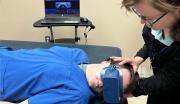
GLP-1 receptor agonists—widely recognized for their ability to aid weight loss and improve blood sugar control—have quickly gained popularity in recent years. While their benefits for diabetes and obesity are well-documented, their impact on cardiovascular health is a topic of growing interest. Dr. Gene Iucci, a Penn Medicine cardiologist who treats patients at the Penn Cardiology office in Somers Point, shared his perspective on how these medications influence heart health, along with the important role of ongoing medical oversight.
Weight Loss and Heart Disease: A Clear Connection
Dr. Iucci begins with a central truth: excess weight is strongly linked to cardiovascular disease. “There is overwhelming evidence and data to say that as your weight and BMI go up, so does your incidence of sleep apnea, atrial fibrillation, hypertension, and coronary artery disease,” he explains. For cardiologists, it’s clear that weight management is one of the most powerful tools in preventing heart disease.
That’s where GLP-1 medications have made a remarkable impact. By slowing gastric motility, they help patients feel full sooner, reducing calorie intake and leading to substantial weight loss. “We’re seeing patients lose 20 to 30 percent of their body weight,” Dr. Iucci notes. “For someone who weighs 300 pounds, that could mean losing 90 pounds in a quick time frame.” Such significant weight reduction directly decreases strain on the heart and lowers risk factors across the board.
Mechanism and Safety
Unlike some older diabetes medications, GLP-1 drugs are designed to act primarily when food is consumed, which reduces the likelihood of severe hypoglycemia. They also appear to provide additional metabolic benefits, such as improved insulin sensitivity and better blood sugar control. Together, these effects contribute to a reduced risk of heart attack and stroke. “By getting your A1C down from seven percent to 6.0-6.5 percent, you’re absolutely lowering your overall cardiac risk,” says Dr. Iucci.Importantly, GLP-1 medications do not directly cause heart
palpitations or increase heart rate the way stimulant-based weight loss drugs can. However, patients may still experience side effects such as nausea, diarrhea, or electrolyte imbalances, which should be carefully monitored.
The Importance of Medical Oversight
While the benefits are substantial, Dr. Iucci emphasizes that careful monitoring is essential. Rapid weight loss often means patients no longer need the same doses of blood pressure or other cardiac medications. “I see two to three patients a day who are dizzy or experiencing heart racing, not because of the GLP-1 itself, but because they’ve lost 60 pounds and no one adjusted their blood pressure medicine,” he explains. Without regular follow-up, these normal effects of weight loss can be mistaken for complications.
In addition, some patients are obtaining these drugs through telemedicine or weight-loss clinics without consistent primary care follow-up. Dr. Iucci stresses the importance of communication with a prescribing physician, regular lab work, and timely medication adjustments. “It’s not enough to see your doctor once a year anymore,” he cautions. “If you’re on these medications, you should be checking in at least every three months.”
A Net Positive for Heart Health
Despite these caveats, Dr. Iucci is clear: the cardiovascular benefits of GLP-1 medications far outweigh the risks when used responsibly. Weight loss improves blood pressure, cholesterol, sleep apnea, and diabetes—all major contributors to heart disease. “There’s no question that these drugs lower the risk factors for cardiac disease,” he says. “But it has to be done with common sense and appropriate medical supervision.”
For patients considering or currently using GLP-1 medications, the key takeaway is balance: embrace the health benefits, but stay in close communication with your healthcare team to ensure safe, effective results.
Dr. Gene Iucci treats patients at Penn Cardiology in Somers Point located on the second floor of 155 Medical Center Way. To make an appointment at Penn Cardiology in Somers Point, call 609-365-3100.










